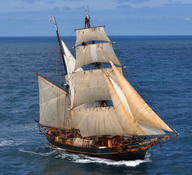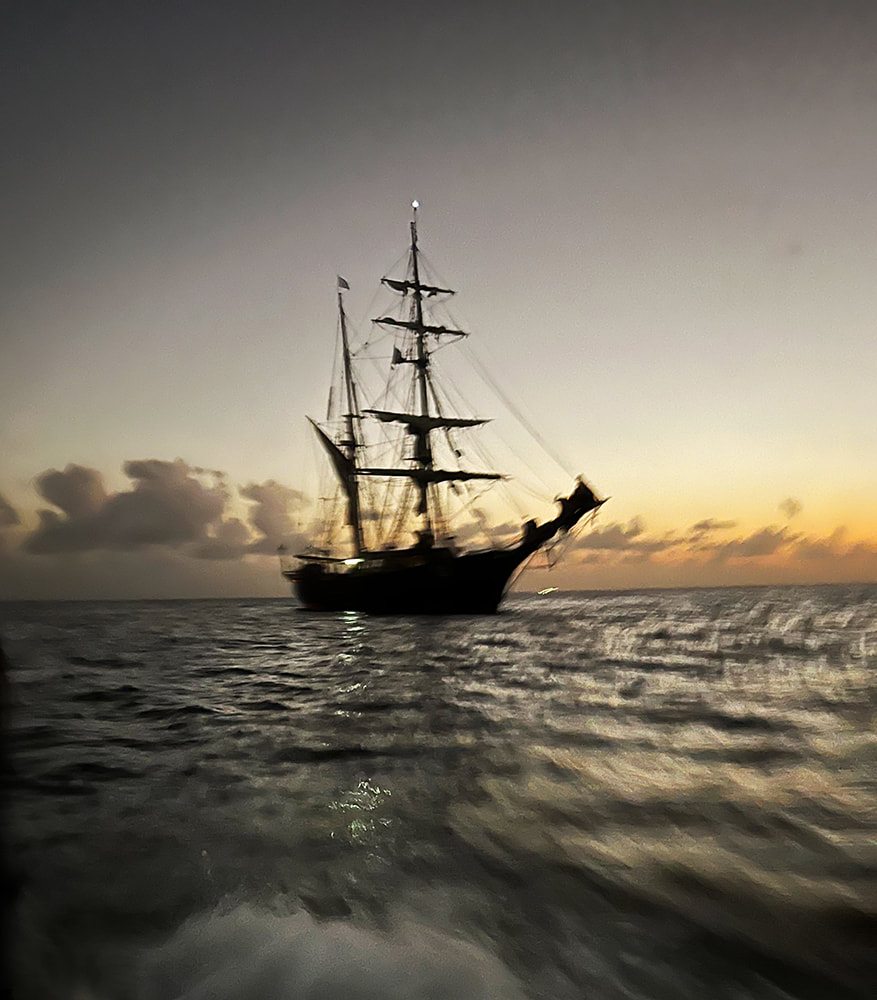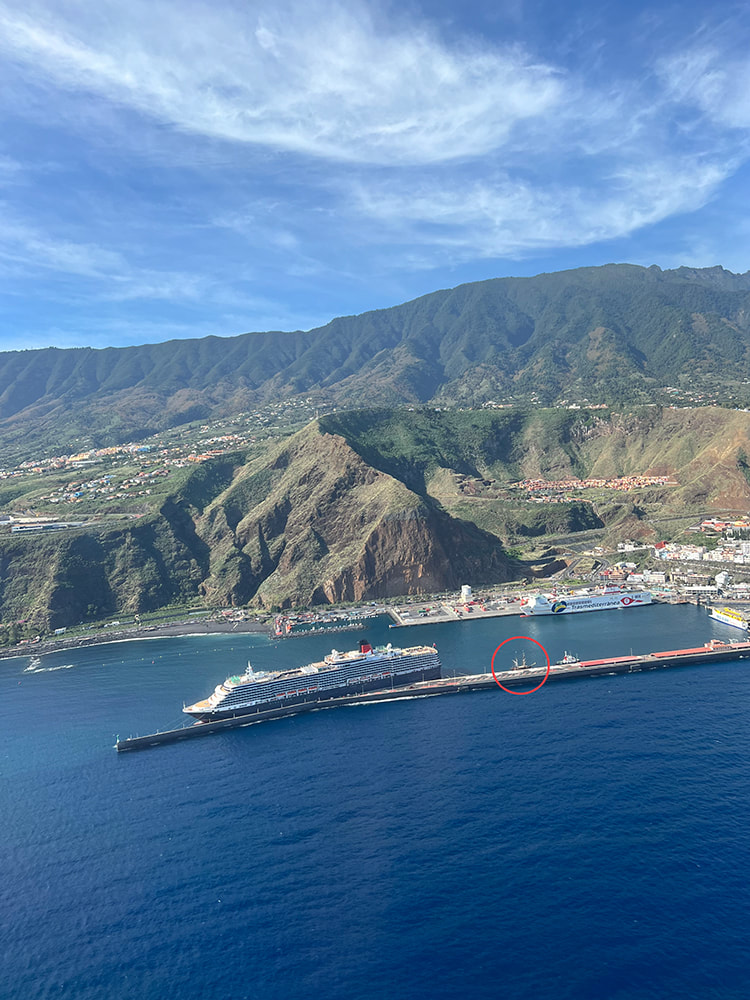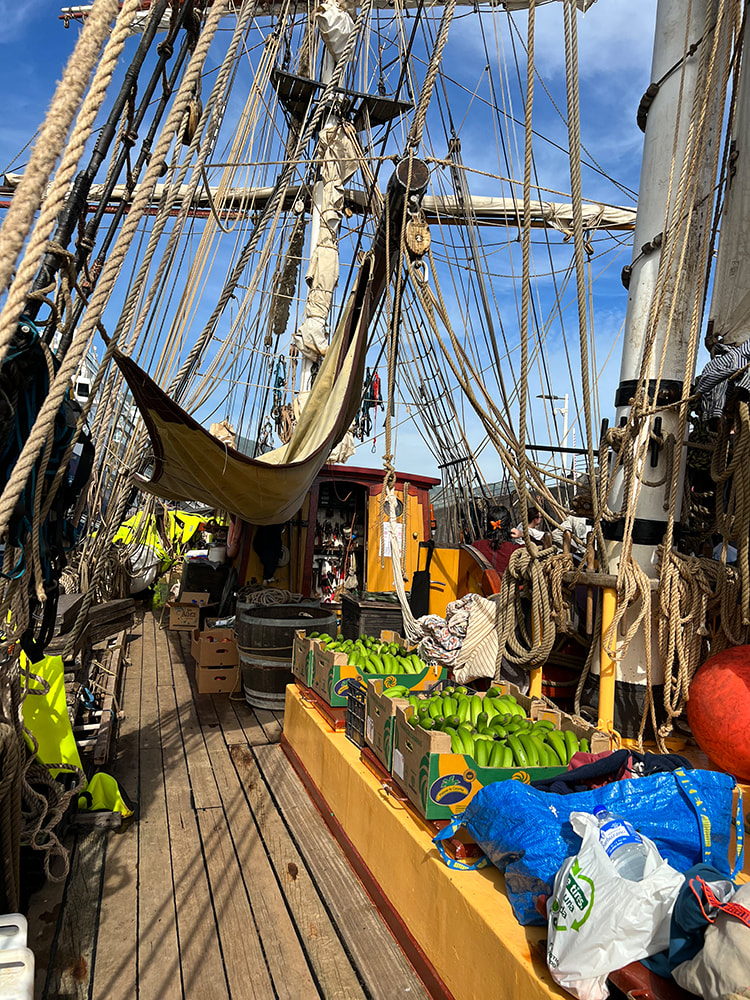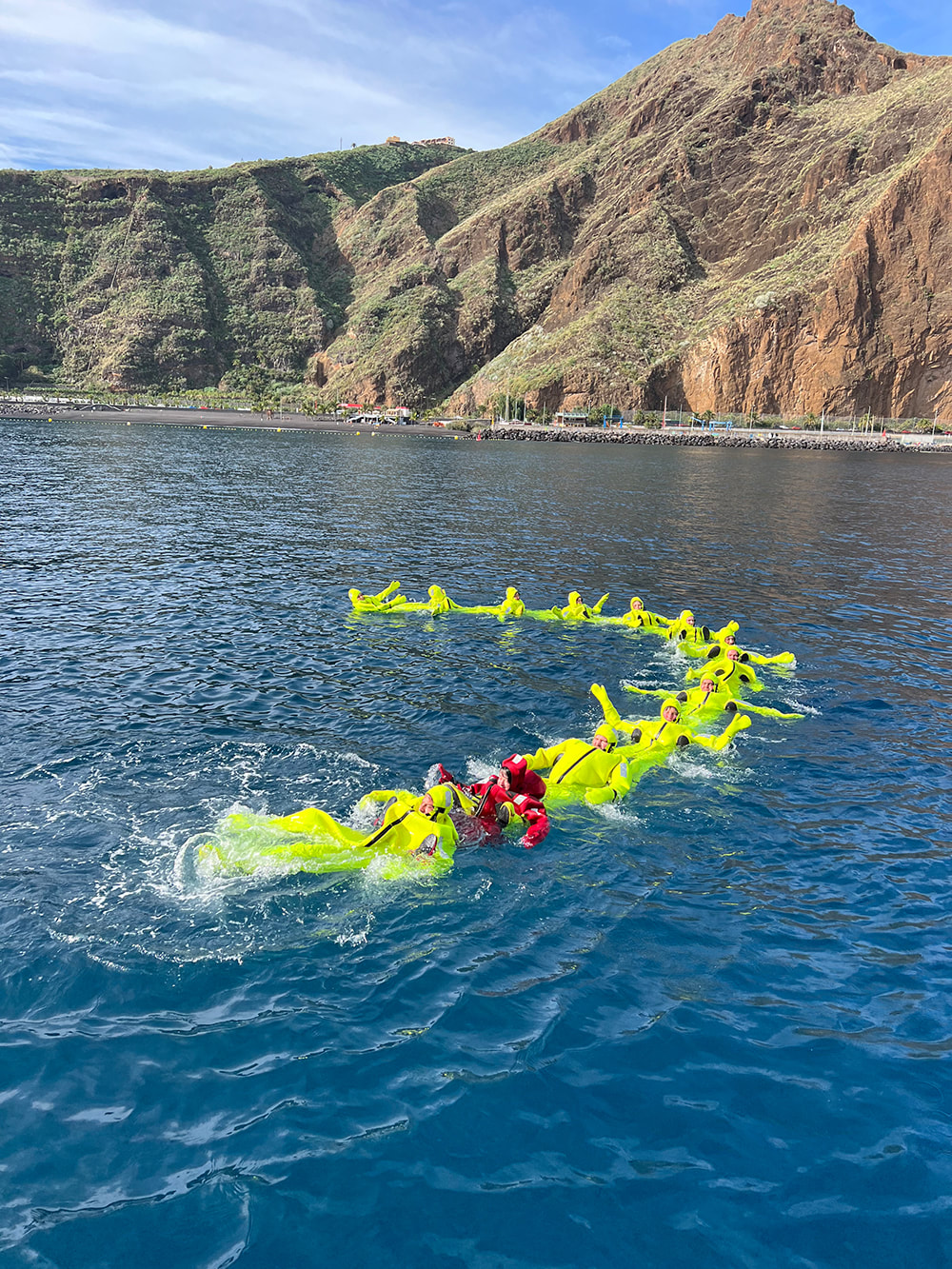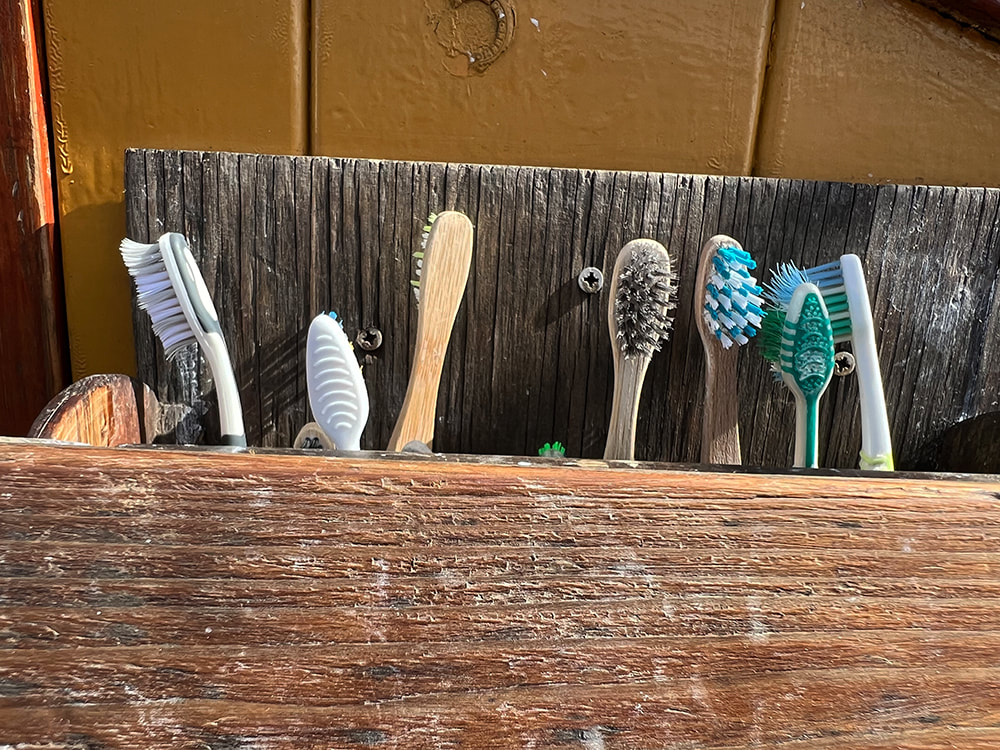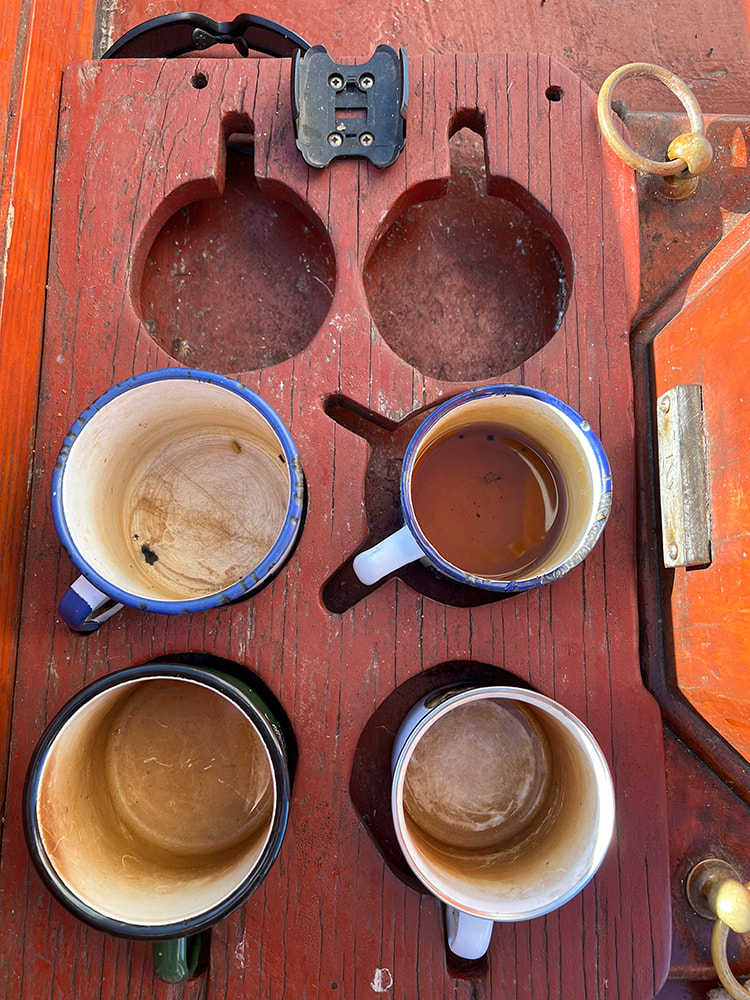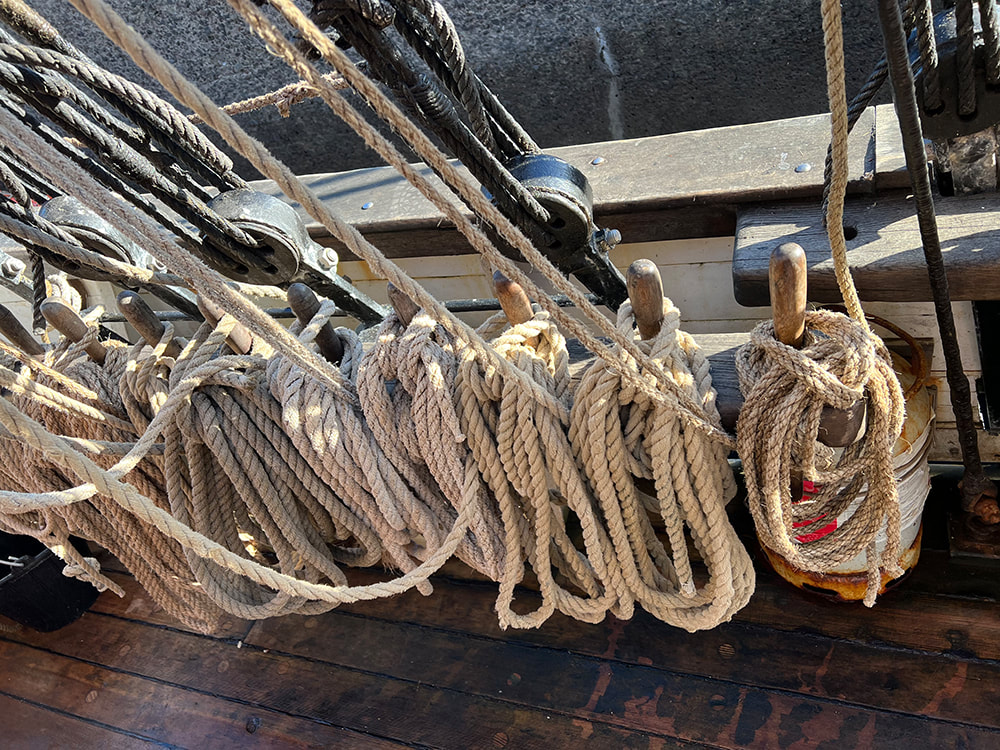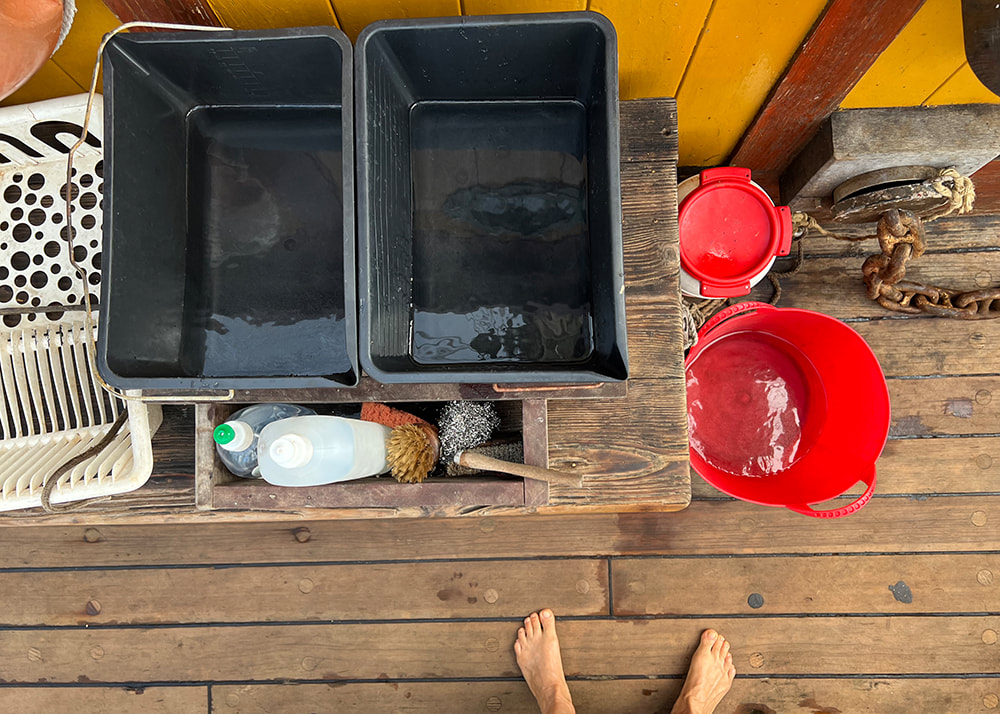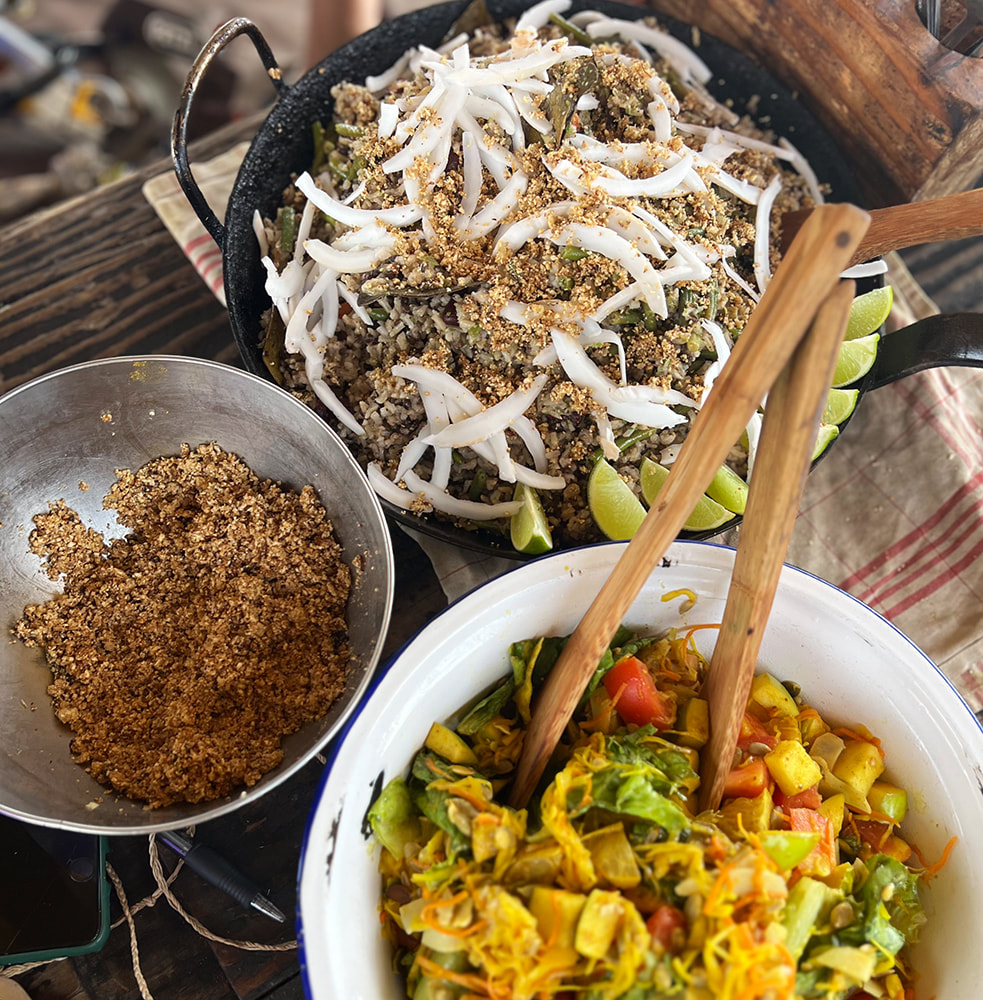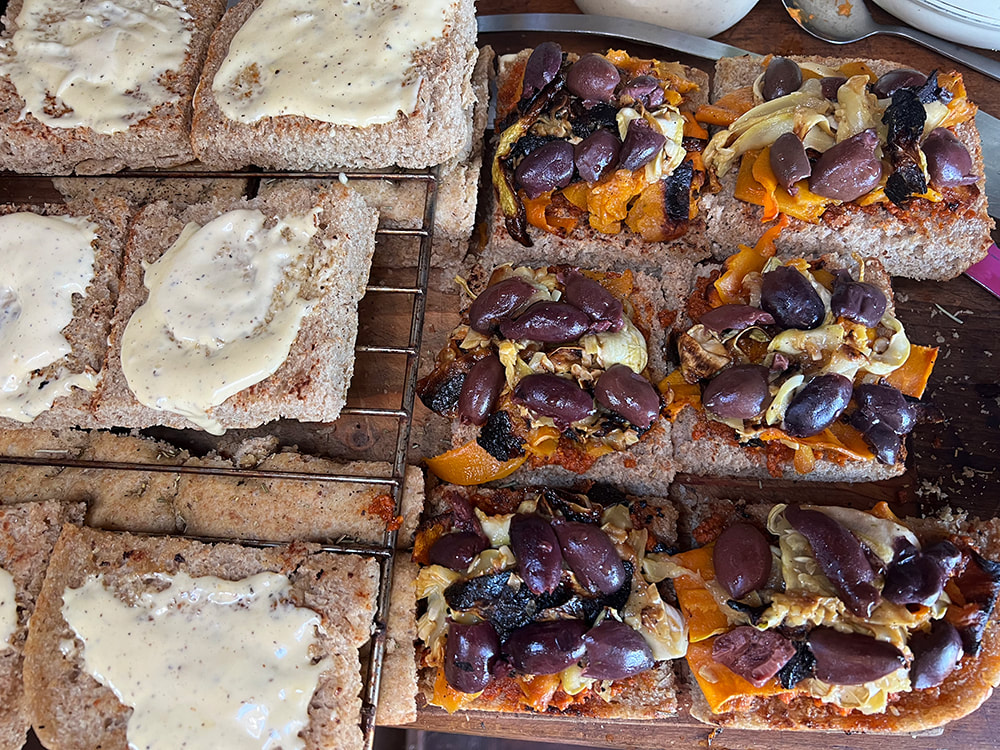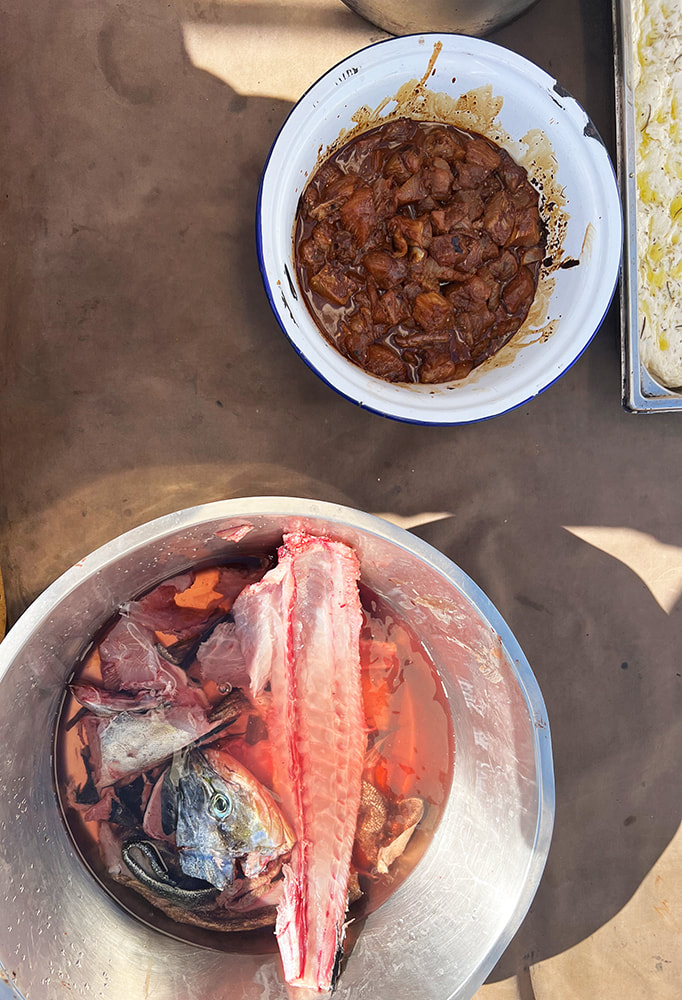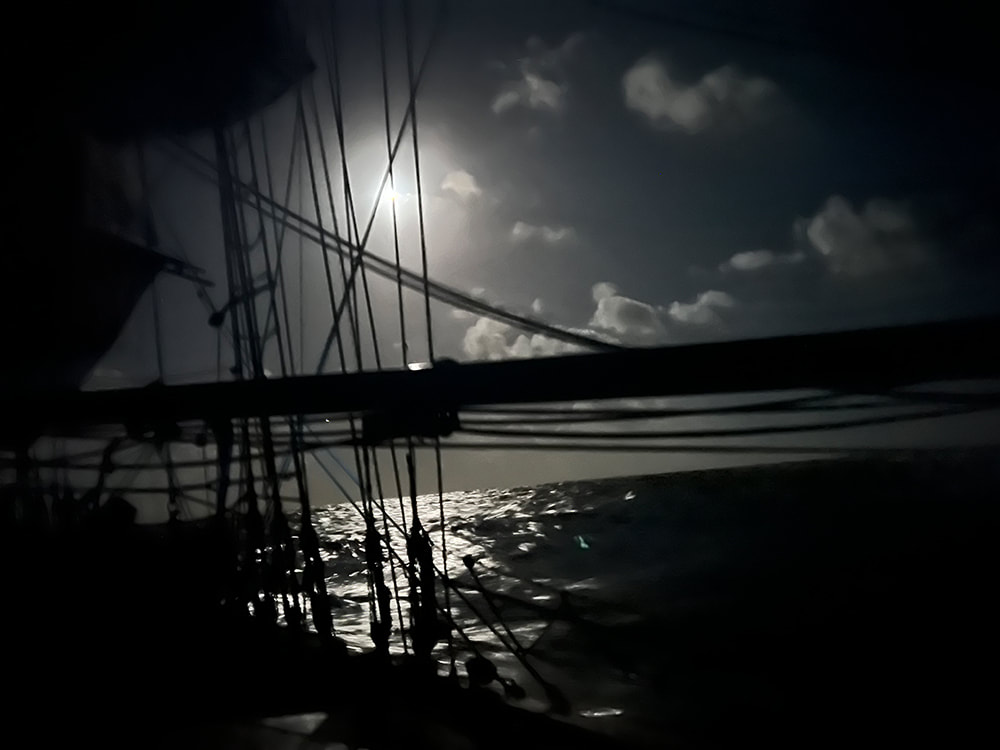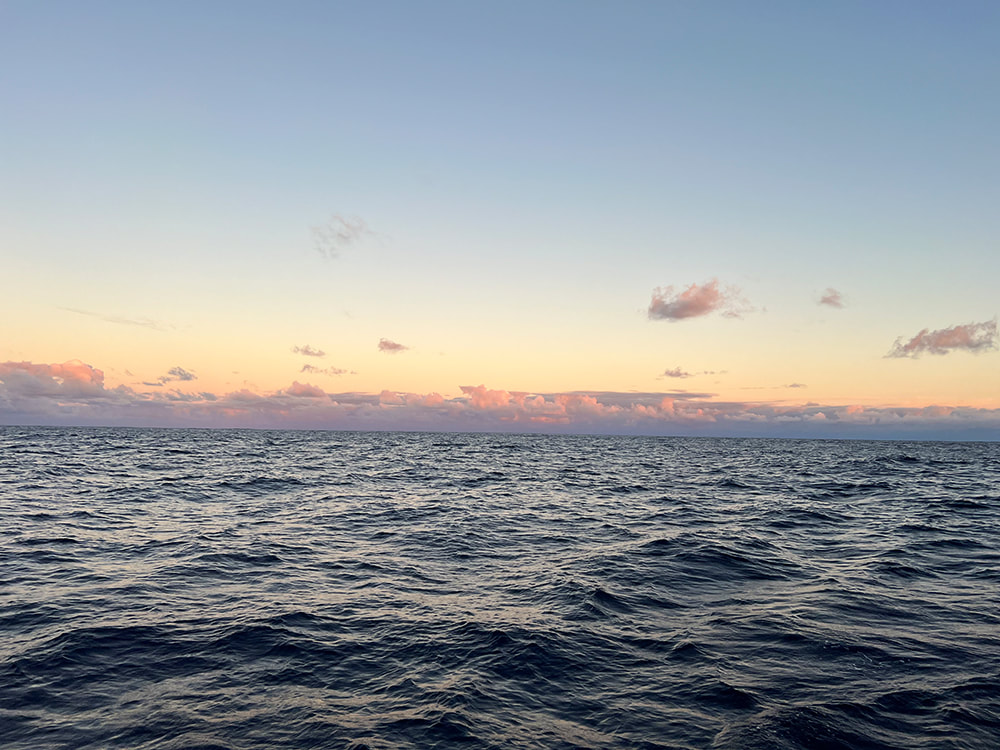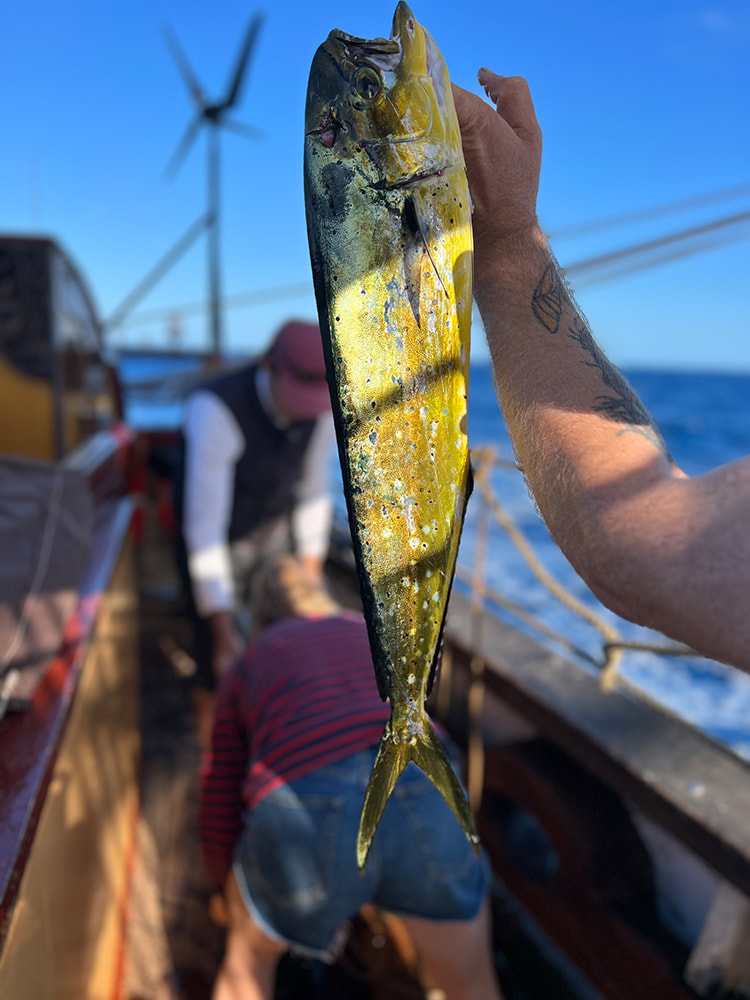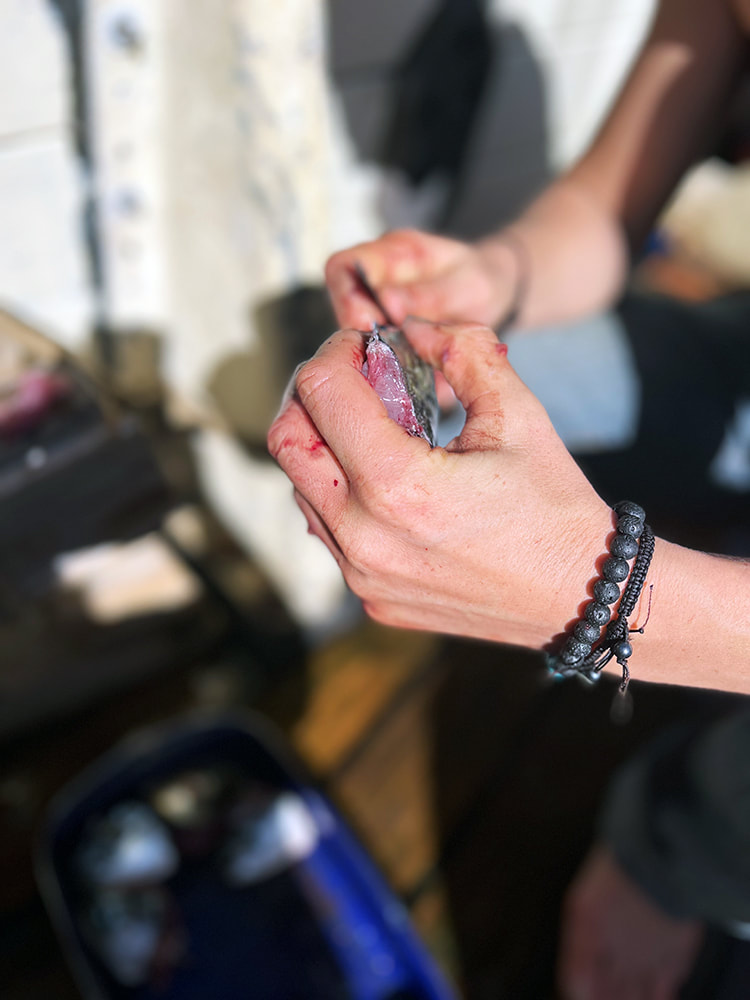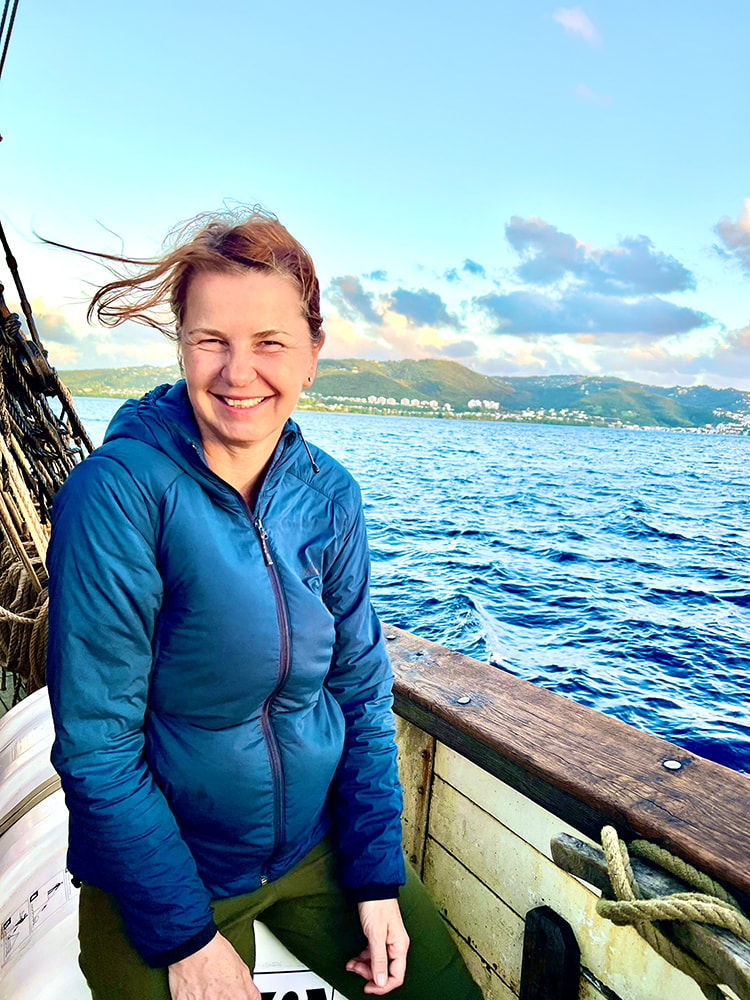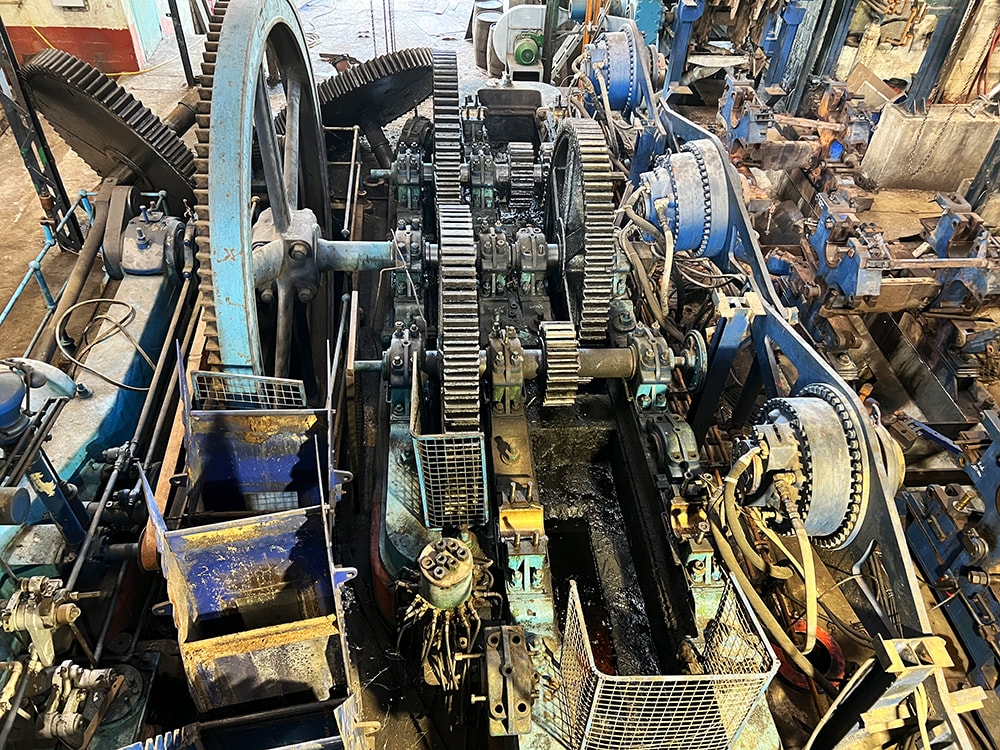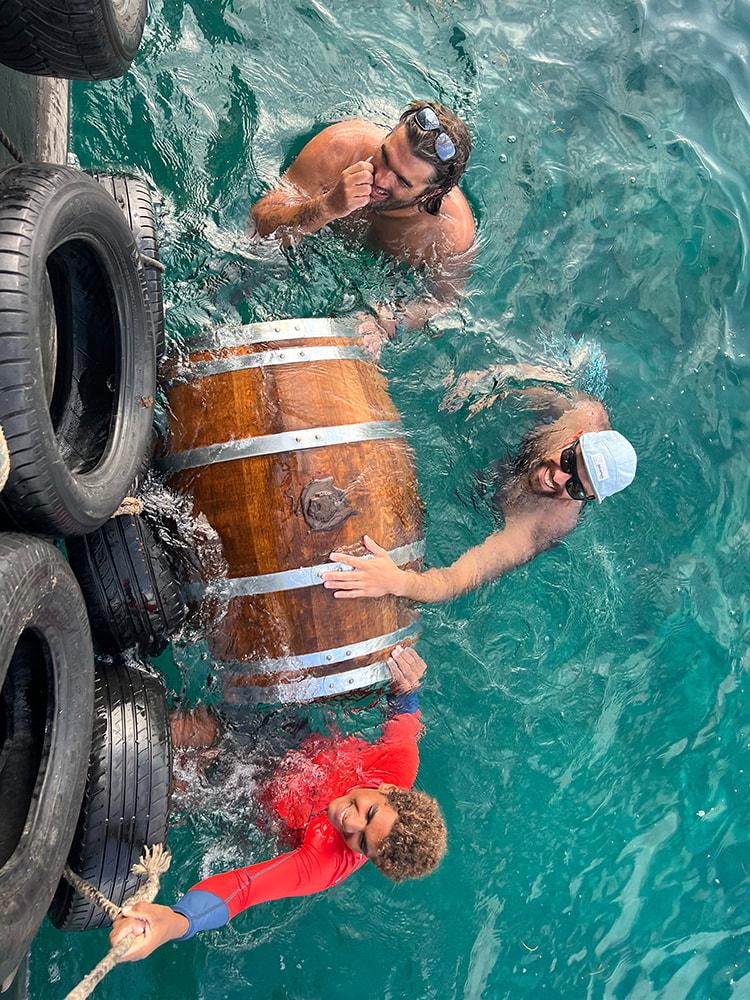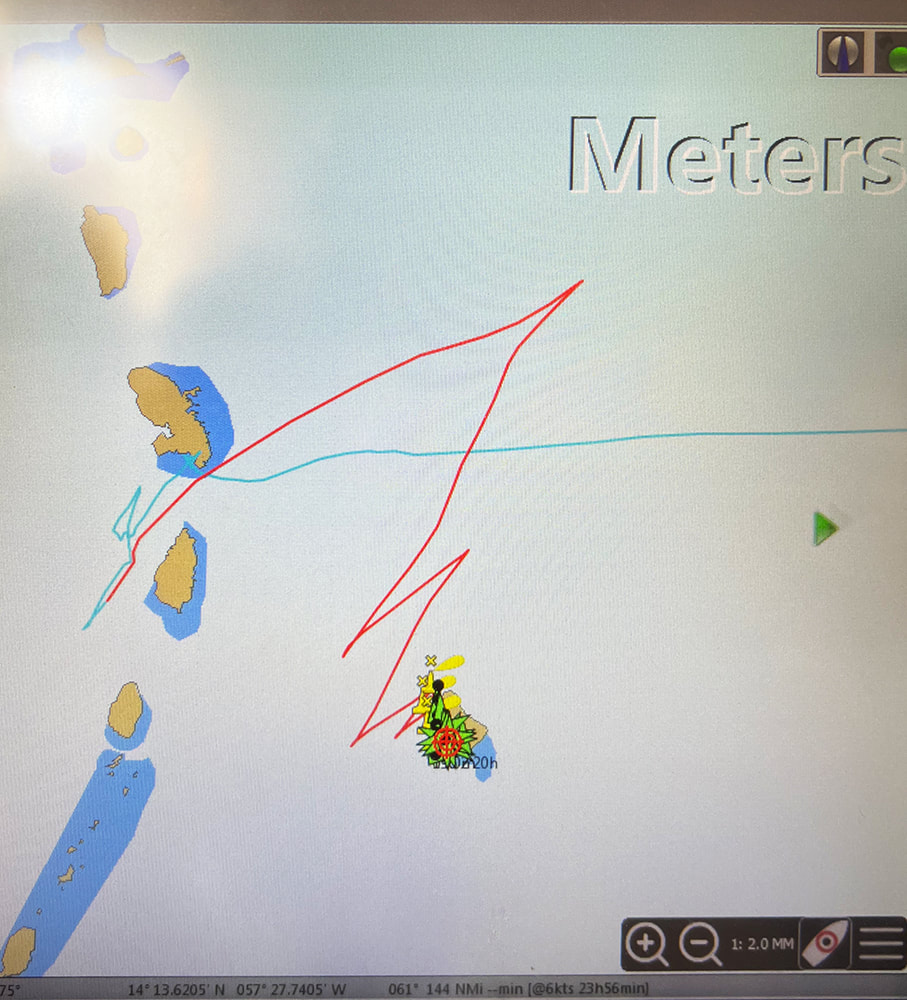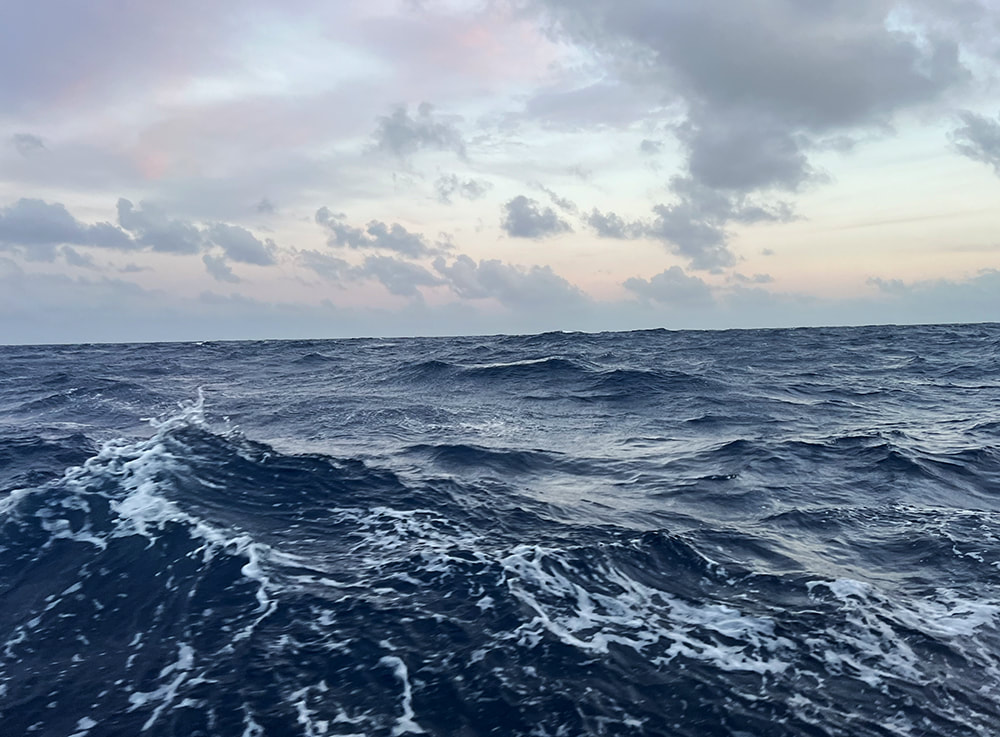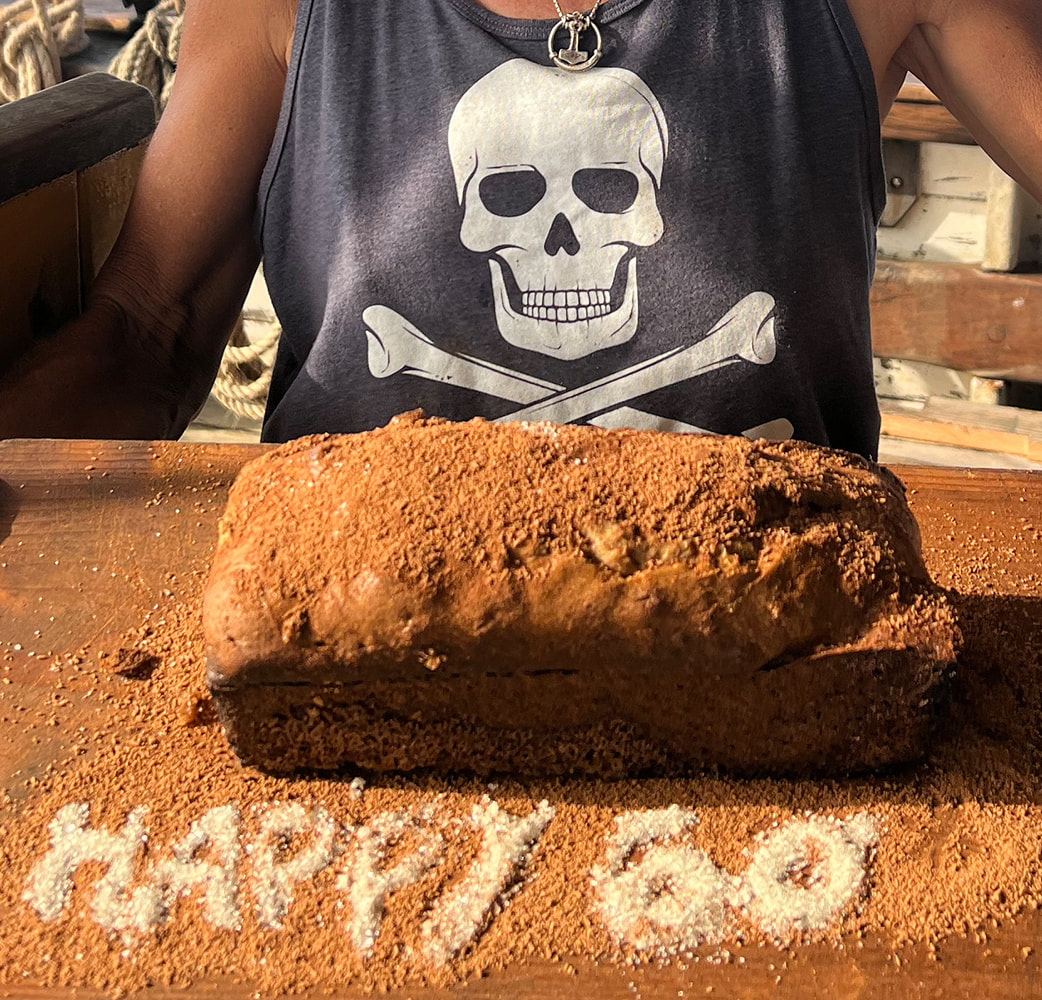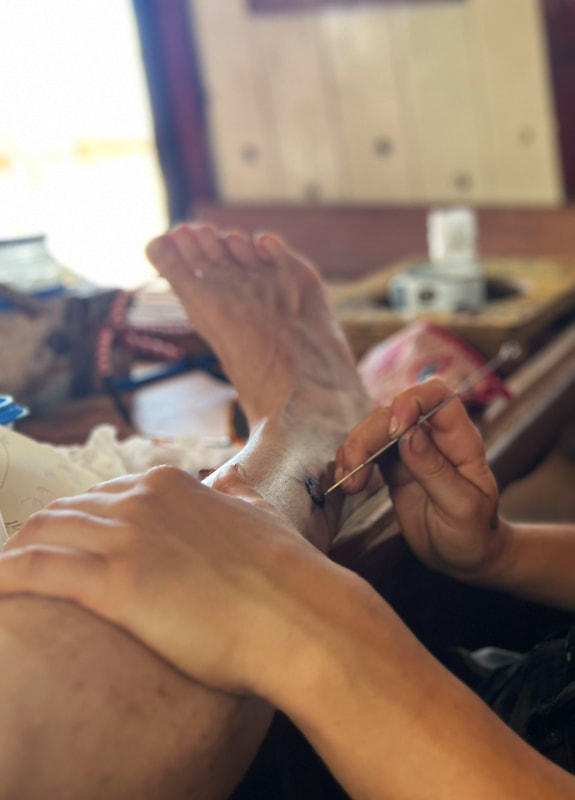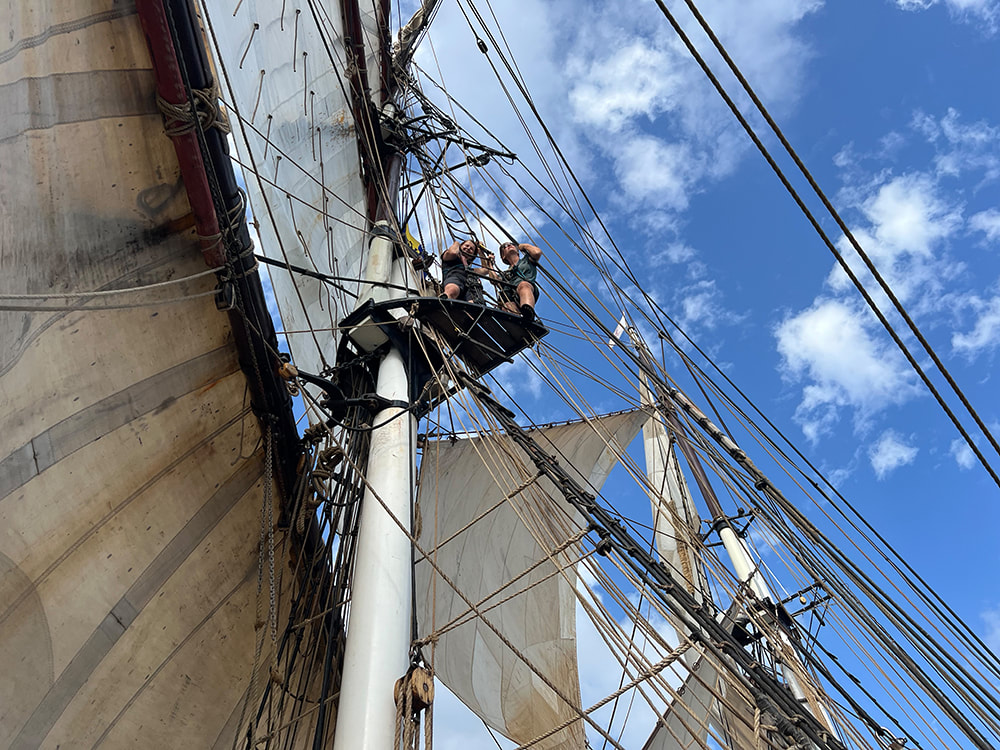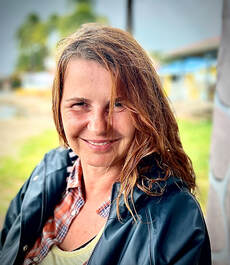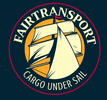A Woman’s Odyssey on the Boundless Seas
|
According to family and friends, I had survived! This was interesting to me. Yes, I just returned from embarking a cargo sailing ship with no motor, crossing the Atlantic Ocean, and sailing in the Caribbean, dropping off and picking up rum. When I got the idea, to go on an adventure like this, there were initial fears: crazy storms, in which we all would drown and get eaten by sharks, or the crew, except me, would die of disease, leaving me all alone to climb the masts and rig the sails with vertigo and no knowledge. I realized quickly that these fears were mainly fed by wonderful pieces of literature and movies, and that sailing the Atlantic during the winter months in the 21st century is a fairly safe affair. Atlantic hurricanes primarily form between June and November. Our sails were to be pushed by the trade winds on a route along the Northern Equatorial Current, another force in the right direction guaranteeing arrival. Surviving that seemed to me so much less threatening than the ongoing long-term exposure to extreme stress due to illnesses, deaths, and even murder in my immediate circle, challenges in relationships and career choices.
I asked myself, why and when do we decide to challenge ourselves with an extreme adventure? Is it running away? Is it about self-optimization? Besides the psychological stress, there was of course an initial dream, precisely depicting crossing an ocean in a big two, three, or four-mast sailing ship. It had manifested itself during childhood, and was invoked here and there throughout the years. Although I didn't grow up by the sea, but rather deep in the forest, the dreamlike images of these ships on the oceans have always accompanied me. As an art student in the 90s, I searched through flea markets in Berlin to find old and weathered model pirate ships. In recent years, the fantasy appeared in form of a very real ship, the Tres Hombres at numerous occasions. At first, I read a long article, perhaps in the German magazines Brandeins or Der Spiegel, that left me in awe. Then a friend in Oslo introduced me to ship’s own chocolate brand, and enthusiastically told me about the it is transported by bicyles from Holland. A year later, I stopped for lunch with a friend in a restaurant in Berlin and found a Tres Hombres-inspired menu with wine imported emission-free. Another year later, a coaching class entitled Creative strategies for sensitive pirates by Marije Vogelzang, a Dutch food designer, intuitively sparked the desire to participate. I was seeking proactive life management tools, next to hanging out on the couch in psychoanalysis. During the course, we had to choose an ‘outer edge experience’, something that you always wanted to do but never made it happen, because you are too scared, too uncomfortable pursuing, or part of you thinks the idea is childish or outrageous. Et voilà, only following the coincidence of repetitive reminders, I was prompted to seriously study the Tres Hombres website to find out if I could join as a trainee.
I asked myself, why and when do we decide to challenge ourselves with an extreme adventure? Is it running away? Is it about self-optimization? Besides the psychological stress, there was of course an initial dream, precisely depicting crossing an ocean in a big two, three, or four-mast sailing ship. It had manifested itself during childhood, and was invoked here and there throughout the years. Although I didn't grow up by the sea, but rather deep in the forest, the dreamlike images of these ships on the oceans have always accompanied me. As an art student in the 90s, I searched through flea markets in Berlin to find old and weathered model pirate ships. In recent years, the fantasy appeared in form of a very real ship, the Tres Hombres at numerous occasions. At first, I read a long article, perhaps in the German magazines Brandeins or Der Spiegel, that left me in awe. Then a friend in Oslo introduced me to ship’s own chocolate brand, and enthusiastically told me about the it is transported by bicyles from Holland. A year later, I stopped for lunch with a friend in a restaurant in Berlin and found a Tres Hombres-inspired menu with wine imported emission-free. Another year later, a coaching class entitled Creative strategies for sensitive pirates by Marije Vogelzang, a Dutch food designer, intuitively sparked the desire to participate. I was seeking proactive life management tools, next to hanging out on the couch in psychoanalysis. During the course, we had to choose an ‘outer edge experience’, something that you always wanted to do but never made it happen, because you are too scared, too uncomfortable pursuing, or part of you thinks the idea is childish or outrageous. Et voilà, only following the coincidence of repetitive reminders, I was prompted to seriously study the Tres Hombres website to find out if I could join as a trainee.
A bridge between past and present?
The phrase 'The future of eco-friendly shipping' was overlaid prominently on a background video. In the video, I saw an old-looking sailing ship, on which relaxed, young people played guitar, pulled ropes, and sorted and roasted coffee beans. To me, this didn't look like the future at all, but rather like the past. I read that the ship transports rum, cocoa, and coffee from the Caribbean to Europe. Hmm, like my colonial ancestors? Is this a conscious attempt to bridge the gap between past and present, from colonialism to fair trade? Or is it just about climate change? I admire the clear statement that Fairtransport Shipping makes with their ship, the Tres Hombres, through motivated commitment and adventurous boldness. Their effort to reduce the global CO2 footprint through sustainable transport is evident, and I wondered why more people aren't doing this. However, I couldn't help but think about how the company is perceived in a cultural-historical context. Rum, coffee, cocoa? All things that I love and consume, but not too long ago, stained our white hands with blood. I made a mental note to research this further.
I scrolled further down and saw a photograph of a sexy sailor with strong arms. What did this image tell me? I imagined being the female version of that and immediately thought about joining the gym... maybe I could finally lose some weight. I continued reading: 'On board our sailing ships, both beginners and experienced sailors find the ideal environment to learn new things about the world of sailing. Getting to know yourself better, developing special skills and abilities, expanding your horizons, facing challenges, pushing yourself beyond limits, and growing together as a team - all of this is part of a great sailing experience.' Getting to know yourself better? Hadn't the two or three times a week on the couch been enough for self-improvement? I added up the following: living a real borderline experience, realizing a dream, getting fit, and taking a real break. The sum sounded like the best next step, and I clicked on 'Sail with us.' I chose a section that fit my schedule and guaranteed some sunshine: from the Canary Islands to the Caribbean, departure at the end of December, returning sometime in mid or late February.
|
The brigantine Tres Hombres was originally built in 1943 as a fishing vessel and rediscovered in a wreck-like state in 2007 by Jorne Langelaan, Arjen van der Veen and Andreas Lackner, who founded the world's first environmentally friendly shipping company in the Netherlands. The ship underwent extensive restoration by dedicated volunteers and was transformed into a fully functional sailing vessel, powered solely by the wind. Today, it annually crosses the Atlantic Ocean and navigates Northern European waters for cargo transport. Regular renovations, with assistance from volunteers learning boat building skills, ensure the ship remains in top condition.
The adventure seemed to be extremely popular, so I was on a waiting list for a while and had time to fantasize. How would it change my life, or myself? What if I get very seasick? What will the people on board be like? Will I be one of very few women? When a spot became available, I began to prepare seriously and stopped playing out hundreds of 'what if' scenarios in my head. I signed up for a sailing course at the Berlin Wannsee – that was the least I could do to avoid looking like a complete idiot on deck. Sailing on small boats on lakes had never interested me. It was always about the big ships, about explorers, scientists, sailors, and pirates. I wanted to get an insight into what these adventurers and passengers from old times experienced and endured. And let's not forget the many slaves! (Not that I presume to have gotten, even remotely, an idea of the horrors of those voyages). However, being completely dependent on wind and current, spending weeks with strangers in a confined space on the ocean, and not knowing when land would be in sight again, was perhaps close to what our ancestors knew. The Tres Hombres has limited internet access, solely for navigational purposes, no engine, no refrigerator (hallelujah to the cook, I'll come to that later), no shower, no sun loungers, no comfortable seating with soft cushions to rest on. Many things that are normal for the many sailing yachts crossing the Atlantic are missing, and deliberately so. Why would anyone choose that voluntarily, especially without sailing experience on an ocean? |
The self-explorer, whether he wants to or not, becomes the explorer of everything else. Elias Canetti |
Yes, exploration! Venturing out and taking a break was certainly a meaningful reason, but unconsciously there was something else: to immerse myself in an entirely unknown territory, one that is physically and mentally so demanding, that there is no space to dwell on all those heart-breaking, mind-rattling, and nerve-shaking things. That was my math, and the equation worked out. Puh!
Spring 2023. In the meantime, life went on with the heartbreaking, mind-rattling, and nerve-shaking stuff. A physical manifestation of it all appeared right in my stomach. It was the first conscious practice in disciplined thinking when, for three long weeks, I did not know if this thing was evil and treacherous or had a dark sense of humor just tickling my cells, mischievously whispering a warning. Either way, the benign thing was cut out, leaving a great scar, which I imagine will be a shark-bite-surviving story once I get back.
Summer… Sailing on the Wannsee... Okay...
Fall… I had forgotten to sign up for the gym. I hurried on and started lifting some weights.
Spring 2023. In the meantime, life went on with the heartbreaking, mind-rattling, and nerve-shaking stuff. A physical manifestation of it all appeared right in my stomach. It was the first conscious practice in disciplined thinking when, for three long weeks, I did not know if this thing was evil and treacherous or had a dark sense of humor just tickling my cells, mischievously whispering a warning. Either way, the benign thing was cut out, leaving a great scar, which I imagine will be a shark-bite-surviving story once I get back.
Summer… Sailing on the Wannsee... Okay...
Fall… I had forgotten to sign up for the gym. I hurried on and started lifting some weights.
Ignoble footprints and Covid for Christmas?
December 2023. According to the Tres Hombres handbook for trainees, I needed 3 sweaters, 3 pants, 4 T-shirts, 2 long-sleeved T-shirts, 2 long warm underwear, work clothes, swimsuit, and towel, a cap or hat and a scarf to protect my neck. I decided to only take washed-out and stained, old clothes with holes since there would be no reason to dress up. Of course, I needed waterproof sailing pants and shoes. Finding both turned out to be a challenge. After several attempts in outdoor gear stores in Berlin, each without good advice and a limited selection, I was forced to order online. I had to return both items because they came in the wrong size. I was ashamed of the ignoble footprints I left. Not that I would count them. I would go crazy. Planning this trip showed me clearly how contradictory our lives are nowadays. To embark on the eco-friendly sailing freight trip, I had to take a flight to La Palma and later again, to fly back from the Caribbean to Berlin. I admit, it wasn't about climate change for me, but about the adventure, the experience, the people, the forced abstinence from the internet and news, as well as from the common comfortable lifestyle, with showers, washing machines, refrigerators and freezers. Damn me!!
I waited to hear from the company. Finally, an email arrived with details about the planned date of departure from La Palma and the exciting news that we would have a female captain! Yippie! I had seen an interview with this amazing woman. I was thrilled. This is what I had hoped for, wondered how many women would be on board and how the male crew would handle having a female captain.
I waited to hear from the company. Finally, an email arrived with details about the planned date of departure from La Palma and the exciting news that we would have a female captain! Yippie! I had seen an interview with this amazing woman. I was thrilled. This is what I had hoped for, wondered how many women would be on board and how the male crew would handle having a female captain.
My flight to La Palma was on December 27th. Shortly before Christmas, I said to my partner, who was travelling, "Darling, when you come back from Switzerland, please wear a mask at the airport and on the plane, Covid is going around." He did, and yet the rapid test on December 23rd was positive. We had invited friends for Christmas dinner, so that they could wish me luck and break a leg before my departure. The next four days were marked by minutes and hours. While my husband stayed behind closed doors in bed, I kept testing myself. Negative... I cooked, drank champagne, deboned a duck, still negative. I had a lovely Christmas dinner with my friends, who assured me that everything would be fine and I wouldn't die... still negative... while packing, headaches and general fatigue arose... still negative. What if these tests aren't accurate? The thought triggered the entire Covid debate of the past four years. Various voices in my head argued about what I should and shouldn't do. I rested. I slept. I took ibuprofen and vitamins. Friends advised me to board the plane first and then see how it goes. Reassess the situation hour by hour. I knew that the Covid laws had changed since I signed the contract with the company a year ago. But was that the point? No, I wanted to make a responsible decision and not endanger others, but also not overreact. The day before departure, I felt sick. I tested myself again. Negative. I packed and decided to fly to La Palma. Not doing so seemed like an exaggerated reaction to me. I would see how I felt there. And definitely keep my distance. Fortunately, my symptoms were mild and not severe. I didn't have to cough or sneeze. A conversation with a friend echoed in my head: "Even if you get Covid, it's just a flu. So if you had the flu now, would you go or not?" he asked. “I would make it dependent on the severity of symptoms, and probably go and keep my distance." Sticking to my answer, I boarded the plane to La Palma.
|
During the flight, my mind was still busy listening to the Covid debate in my head. As we approached La Palma, we flew over the harbor. I saw a mega cruise ship and next to it, tiny, looking like an ant, was the Tres Hombres! A rush of excitement tingled through my entire body. I took a taxi to my accommodation, still hoping for a delay in departure due to cargo or a crew member being late. I took a deep breath, let the sun in, popped another ibuprofen and vitamins, and planned to get some food somewhere and go to bed early. And I had to call the captain! I vaguely mentioned that I wasn't feeling well and asked when the ship would depart. "Please come early tomorrow morning and be on board. Then you can get used to everything, we'll set sail the morning after tomorrow," she replied, in a very cheerful mood. Her response triggered another strong sensation of tingling in me, but this time it was panic.
Lunch at the harbor... buying water somewhere... back to the hotel... ibuprofen... sleep... Morning of December 28th. Negative. I felt slightly better. When arriving at the harbor and I had to pass by the monster cruise ship I had seen from the airplane. I imagined taking a vacation on such a mega-ship hotel on the water. Then I'd rather fly directly to Las Vegas and spare all the ocean creatures the sight, the noise, and the waste I produce, I thought.
|
Surely my trainee fee was just as expensive as a cruise ticket. But there, passengers would sleep in a private cabin with a nice bed, have their own bathroom with a shower. They would hang out by the pool and post their adventure on Insta or watch Netflix. They would graze through buffet after buffet, and in the evening, they would sit amused at one of the many bars. Imagining this, was further confirmation that I had made the right decision to book the upcoming adventure.
Rum Barrels and Green Bananas
|
I boarded in the midst of a busy crew and trainees getting ready to receive and store cargo. Several empty barrels, which were to be filled with rum in the Caribbean, were heaved with lines into the cargo hole. All the food the ship’s cook had ordered arrived and had to be stored. Pumpkins, potatoes, beets, cabbage, mushrooms, carrots, and lots of other vegetables, among them about 300 green bananas, which we were given to us as a gift. The 200 eggs for Sunday’s breakfasts had to be transferred to special plastic crates. A giant leg of ham, which later was christening ‘leg Ryan’ for Sundays as meat day was hung in the cargo hole. The ship reminded me of a farm my sister lived for a while during her hard-core hippie years. Clothes and towels were hanging on every mast and horizontal ropes. Somebody murmured an excuse to me, "We are all doing laundry," and showed me my bunk. I would share a cabin a young woman from Belgium. Pretending that I had my regular fitness and strength, I climbed down the ladder. Having read about the ship, I knew it wasn’t a comfortable, clean accommodation. It was a working ship, and it transported cargo. The ship was built with old wood and steel. Beams, bolts, and a lot of rust were clearly visible from my top bunk, which was so narrow towards the ceiling that I wondered how to squeeze myself in there. I dropped my backpack, ignoring quick thoughts about how uncomfortable this would be. I was expected back on the deck for a meeting.
|
The captain shared important details and safety precautions for the departure maneuver the next morning and welcomed us newcomers. The crew and trainees introduced themselves. I counted 9 women and 6 men. A female captain, two male first officers, two female deckhands, one female bosun, one female cook, three male, and five female trainees. The age range spanned from early twenties to mid-fifties, with me being the oldest, which felt really strange.
|
Our captain called for an immersion suit test maneuver. 'Under no circumstances am I participating in my current state, no matter what everyone thinks of me,' I thought. I filmed and photographed the 14 Teletubbies, each jumping into the blue water one by one and practicing formations that would be clearly visible from above and afar in case of an emergency. I received my personal safety harness, which I marked with my name using a marker, and adjusted it under the guidance of a sailor.
I don't remember how that day ended anymore. There was much to do to prepare for departure the next morning. By evening, my new home looked like a ship again, everything was stowed away and securely tied down. We had a delicious dinner. I excused myself early, descended into my bunk, took ibuprofen and a sleeping pill.
The crossing
In the morning I was woken by somebody. I had slept well, liking the gentle rocking of the ship and felt better. I heaved myself onto deck to pick up a yummy porridge breakfast from the galley. Lots of people strapped on their harnesses and climbed up the masts to untie the sails, of which some were to be hoisted to sail out of the harbor.
|
I watched with fascination, still making sure to keep my distance. Our dinghy pulled us out, with help from the wind in the course sail. We set course South towards Cabo Verde. We started with only a bit of wind. Even with all sails set, we were going 2-3 knots at the most. From then on, the days remain a blur. I remember staring onto the water, still seeing La Palma, then we passed La Gomera, then El Hierro. No more reception. I thought about how it would be to wake up not seeing land.
|
Except for the cook, everyone had to immediately adapt to the ship's schedule, based on watch duty. With a crew of 15 people, 19 sails, expected trade winds, and steering along the North equatorial current, the captain decided to hold a six-hour watch with three groups: 8 am to 2 pm, 2 pm to 8 pm, 8 pm to 2 am, and 2 am to 8 am. Everyone seemed very happy about this and shared stories about how challenging the 'Swedish watch' was on the first leg from Den Helder to La Palma, with severe weather and waves in the Bay of Biscay. The group seemed great. Interesting characters for sure, but immediately sweet, open and welcoming people from Holland, Sweden, Belgium, Austria, Germany, France, Switzerland, the USA, and Australia. This was to be my family for the next 5-7 weeks.
We had a smooth start at sea. The rocking was steady but still relatively mild. I ate small meals and skipped dinner if I wasn't needed on watch. I learned on the first day that it's better to avoid having food sloshing from one side of my stomach to the other while trying to sleep. I was fully expecting to get seasick at some point, so I took all the preventive measures for a mild and short-lived version. I took the tablets before bedtime, stopped drinking coffee, and alcohol was not allowed anyway.
On the fourth day, after we had passed northwest of the islands of Cabo Verde, large swells began lifting the boat on the starboard side, rolling beneath us, and lowering the port side. The wave continued like a massive mountain, and as soon as it disappeared on the horizon, the next one followed. Initially, I struggled to trust the physics and had to squint my eyes when a swell caused the ship to tilt sharply to the side. The young doctor from Austria, a very experienced skipper and also trainee on board, noticed my problem and explained in a clear voice: "Kit, the boat can't capsize, it has a keel." That helped. I felt safer. I realized that it's better to trust my sea-savvy crew mates with their experience than to succumb to my own fears. Most of the crew had sailed many voyages, seemed extremely calm, feared nothing, and hoped that the wind would soon pick up.
|
|
I began to learn the language. By this, I don't mean English, but the hundreds of terms that need to be memorized – from the names of the sails, the rigging with its associated pins (92!), the halyards and sheet blocks, the commands, to all the parts of a brigantine with two masts.
I learned all sorts of things. Taking the helm and steering to 210° south. Hoisting and securing halyards or sheets. Simple tasks for us, like making coffee and tea, suddenly became nerve-wracking balancing acts. I learned to wash hair, body, and clothes on the rocking deck of the boat. With a 5000-liter freshwater tank on the ship, we could use fresh water for a final rinse of hair or clothes washing. It was a fine detail to avoid more discomfort, because with only saltwater, hair becomes brittle, and clothes never dry properly. I learned to wash dishes, scrub the deck, and pump the bilges. Scraping, sanding, and oiling all important wooden boat parts. I learned that linseed oil rags cannot be stored when crumpled up, as they can ignite. I learned to tar the shrouds, repair the mainsail, and splice ropes. And finally, I was brave enough to climb the shrouds up to the first platform. It was a significant achievement for me. As our course finally met the trade winds, I learned to walk the heavily rolling ship at speeds of 7 to 9 knots from A to B. I was the third person to break a toe on the same wooden piece on deck. The bruises also accumulated from constantly banging against walls, railings, metal, shrouds, and wood.
|
A Rolling Galley and a very talented cook
Mondays was the cook’s day off. So whoever was on watch had to prepare a meal. As a passionate part-time cook, I volunteered. Not only was I curious about the task, but I also wanted to contribute something to the crew, as I often felt useless and incapable. I struggled to remember which ropes belonged to which sails and was not as physically strong as the rest of the crew. The intensity of cooking a warm meal for 15 people in a rolling galley is still hard to imagine, even now in retrospect. Handling pots and pans with boiling water and oil while the ship leaned heavily sideways due to the swell and wind, causing my heart to race. Sometimes waves hit the ship with sudden force or created such a steep angle that I had to hold on tight to avoid being thrown into the sea through the galley door. The captain calmly suggested that I could put on my safety harness. And Hallelujah for the cook. I had the utmost admiration. Not only because of the physical and mental strength required under these conditions, but also because he created three delicious and nutritious vegetarian meals per day for 15 people from scratch, constantly coming up with new dishes. He mastered the art of planning meals with fresh ingredients for a period of 3 to 5 weeks without a refrigerator, generating almost no waste.
Night watch
|
The night watch from 2 to 8 in the morning was everybody’s favorite. Crew or trainees who had the previous watch would wake up the next group at 1:45 a.m. I loved it when it was the ocean rower from Seattle. He had a voice like a relaxed news anchor and would wake me up something like this: "Good morning, Kit. We have a beautiful, clear night with millions of stars. You can expect the moon rise around 2:37 a.m. We're sailing at 5.4 knots on a course of 235° southwest. There are dolphins nearby and flying fish." I spiraled out of the tight bunk bed, put on a sweater, pants, and shoes, donned a headlamp, packed a small backpack with a water bottle, toothbrush, toothpaste, phone for taking pictures, sunglasses, and sunscreen for the morning sun, a book, and a notebook. On deck, we gathered aft around the steering wheel and relieved the previous watch. We stayed aft for the entire watch, not only to have the best view of the ship and sails but also to keep an eye out for our colleagues. During the 6 hours, we took turns at the helm, maneuverd, baked sourdough bread, snacked in the galley, told stories, solved crime mysteries, learned French, read aloud, or simply dozed off while standing or sitting on deck.
|
The sea, once it casts its spell, holds one in its net of wonder forever.
— Jacques Yves Cousteau |
Stargazing. Orion, one of the easiest to find star formations, moved across the night sky as time passed. Cassiopeia appearing as a W, Taurus, V-shaped and dominated by a bright red star (Aldebaran, marking the Bull’s eye), and holding the Pleiades. Whereas the moon in Northern Europe is a crescent to the side when not full, near the equator it is tilted downwards towards the earth like a ceiling lamp. When no moon, the Milky Way dropped into the sea. The German term Himmelszelt (canopy of heaven) was a very sensation, leaving me with a feeling of belonging to ancient times and things beyond our knowledge.
Only very few times did we spot other ships. We were mostly by ourselves on the vast ocean. And I have to say, most of the time, I felt safe and in a strange way nurtured and watched over.
Only very few times did we spot other ships. We were mostly by ourselves on the vast ocean. And I have to say, most of the time, I felt safe and in a strange way nurtured and watched over.
Soundscape
The soundscape crystallized at night. The flopping of sails, the clunking of wooden blocks against stays or masts, waves hitting the boat, water being pushed away by the boat producing swirly, bubbly sounds, the turning of the windmills in the aft. Sometimes flying fish, in need of being saved, flopped on deck, or dolphins wheezed and blew nearby. If the ship was rocking too hard, or sails were flopping too angrily, our talented captain managed to calm things with a keen eye and a subtle intuition. Based on a deep knowledge and a trained sensitivity of how the ship supposed to sound and move, she often simply tightened or loosened a rope here and there, or had her watch apply a small maneuver or a tack. Truly fascinating.
Then sunrise. The black water first turned to a rich titanium grey, then silver, before acquiring that hypnotizing electric blue of the Atlantic. Stratos cumulus clouds in the mornings painted a spectrum of hues in the silver water, with yellows, greens, pinks and purples.
Then sunrise. The black water first turned to a rich titanium grey, then silver, before acquiring that hypnotizing electric blue of the Atlantic. Stratos cumulus clouds in the mornings painted a spectrum of hues in the silver water, with yellows, greens, pinks and purples.
Practicing democracy and undoing of mansplaining
|
Then it was all about cleaning and filleting the fish. Especially the younger sailors on board were eager to learn. We almost needed a sign-up sheet to determine who would practice next. I was also eager, not because I wanted to learn—I grew up with a trout farm and am a professional chef—but because the whole atmosphere invited it. Despite my announcement of my knowledge of how to clean and fillet a fish, I kept hearing from one of the first officers, "Yes, next time it's your turn, and then I'll show you how it's done." However, the Mahi-Mahis had disappeared by then. It wasn't until later in the Caribbean, that I had the opportunity to fillet a Barracuda on deck with my knife. By then, I had found a gentle voice to inform my young and eager teacher, that I am certainly capable of cleaning and filleting a fish by myself.
A men’s Odyssey and an Italian-German soap opera
Ocean sailing has been, and still is, a men’s world. Only recently do we hear about female captains and first officers, female bosuns, female sailors in general. The stories I heard from my female colleagues on board about sailing on various ships shocked me.
|
From not being taken seriously despite having solid knowledge and top qualifications from nautical academies, to being laughed at and made the object of sexist jokes, from groping to rape. I'm talking about the present time, the 21st century! I found it ironic that the only book I brought with me was Homer's Odyssey. Despite Emily Wilson's newly celebrated translation, which avoids terms like "sluts and whores" for describing women, to me, it was nothing more than a glorification of male vanity and brutality. Even though Athena's intelligent magic was of immense help to Odysseus and indeed enabled his survival, the focus remains on the whims and vanities of the male gods and their favorites. I found no wisdom in this book. I mean, there are some great literary works that are even older and contain wise ideas that still make sense today. Nevertheless, the book suited the journey entertainingly, and reconfirmed how deeply separate men and women were, and in many ways still are, for thousands of years.
An incident on board highlighted our deeply conditioned understanding of gender roles. An affair between a first mate and a trainee was exposed by the first officer's girlfriend, also a trainee on board. What a drama! Perhaps now, it could be material for stand-up comedy, but in that moment, in the middle of the Atlantic, the participants suffered immeasurably. The entire crew witnessed an unpleasant relationship drama. Not only were we annoyed by the bad mood, but we also had genuine fears that one of the women involved might jump overboard. Moreover, there was no guarantee that our motor-less brigantine, sailing at 6 to 8 knots over the Atlantic with heavy swells, could save a life of a madman or woman, if going overboard. The participants in this act had to navigate the emotional situation for 10 days. But they couldn't and involved the entire crew. Gossip, bad mood, a lot of us felt as if they had to take a side. There were completely absurd demands, like 'I want her to stay out of my way'. This was almost funny, how was that supposed to work? All three were asked to disembarked in Martinique.
An incident on board highlighted our deeply conditioned understanding of gender roles. An affair between a first mate and a trainee was exposed by the first officer's girlfriend, also a trainee on board. What a drama! Perhaps now, it could be material for stand-up comedy, but in that moment, in the middle of the Atlantic, the participants suffered immeasurably. The entire crew witnessed an unpleasant relationship drama. Not only were we annoyed by the bad mood, but we also had genuine fears that one of the women involved might jump overboard. Moreover, there was no guarantee that our motor-less brigantine, sailing at 6 to 8 knots over the Atlantic with heavy swells, could save a life of a madman or woman, if going overboard. The participants in this act had to navigate the emotional situation for 10 days. But they couldn't and involved the entire crew. Gossip, bad mood, a lot of us felt as if they had to take a side. There were completely absurd demands, like 'I want her to stay out of my way'. This was almost funny, how was that supposed to work? All three were asked to disembarked in Martinique.
Arrival
|
6:30 in the morning. An unforgettable moment. We maneuvered in a zigzag course to the planned anchor spot in a bay off the town of St. Anne in Martinique. Everybody was on board, having breakfast and taking positions at downhauls or sheets, while about crew members prepared the anchor. Commands were shouted. The jibs were hoisted first, then all the square sails of the foremast - the foresail, main course, topsail, and royal. Then the mainsail. It was like eagerly awaiting the grand finale of a symphony concert. The anchor dropped. Silence. Then cheers, laughter, applause, hugs, kisses. After 25 days, we had arrived in the bay of Martinique. A moment of ecstatic feeling enveloped us collectively. We gathered quietly and thoughtfully in midship. The captain brought out two bottles of finest rum, specially reserved for this occasion. She gave a moving speech about camaraderie, perseverance and patience. How what we had accomplished is only possible with true team spirit, and that this was the magic of ocean sailing. In silence, I thanked the goddess Athena, for without her wisdom, Odysseus would never have returned home.
Part of me wanted this not to end, ever. It wouldn’t yet, but it would be very different. In the Caribbean, I experienced land under my feet and land sickness. It’s as if you are in an earthquake or had taken LSD, and lying on a waterbed when sleeping. Absurdly, but with absolute acuteness, one holds on to walls, doorknobs, edges of furniture while walking through a restaurant or apartment. I fell when waking on a sidewalk. I guess there are people like me; they don’t get seasick, but then Mal-de-Debarquement hits them hard. |
The bloody rum
As sugar became a major industry in the Caribbean during the height of colonial power, the need to utilize its by-product, molasses, was imminent. Rum appears in historic archives in Barbados around 1650, although it is believed that it was produced earlier. Not just across the islands, but also in other parts of the world. Rum played a key role in the triangular trade, a transatlantic network exchanging goods between Europe, Africa, and the Americas. African slaves were transported to the Caribbean to work on sugar plantations to produce sugarcane, molasses, and rum, which was traded for manufactured goods, including firearms and textiles. These goods were then transported to Africa to purchase more slaves, completing the triangular trade cycle.
I wondered if there are still visible traces of the once brutal, bloody, and ruthless history of rum production. After all, there should still be structures, practices, and market mechanisms in place. Are there still economic and socio-cultural historical legacies reflecting inequality, exploitation, or cultural appropriation that continue to persist? Numerous distilleries have inherited the stolen land from their ancestors. In my brief time on land, I couldn't get a sense of whether fair wages are paid, or what the general working conditions are like. But it was evident that all distilleries perpetuated the romantic and exotic image of Caribbean rum culture for marketing purposes, thus continuing the colonial narrative.
I wondered if there are still visible traces of the once brutal, bloody, and ruthless history of rum production. After all, there should still be structures, practices, and market mechanisms in place. Are there still economic and socio-cultural historical legacies reflecting inequality, exploitation, or cultural appropriation that continue to persist? Numerous distilleries have inherited the stolen land from their ancestors. In my brief time on land, I couldn't get a sense of whether fair wages are paid, or what the general working conditions are like. But it was evident that all distilleries perpetuated the romantic and exotic image of Caribbean rum culture for marketing purposes, thus continuing the colonial narrative.
|
After a truly fascinating tour through the factory, we got to taste the truly exquisite and finely nuanced rumbullion. We watched our barrels being filled. Later they would be dropped on a beach and pushed by a group of swimmers to our boat. What a spectacle it was. There were over 200 people on the beach, French TV crews, local radio stations, photographers, and journalists. About 30 people had signed up to swim the barrels to our boat, anchored about 1000 meters offshore in the Bay of St. Anne. Back on the ship, I observed the first arriving barrels and helped with cargo storage, pulling ropes. Journalists filmed and interviewed the captain and other French-speaking crew members. It was all much fun, and a very clever marketing strategy. I have no doubt that the Tres Hombres products being transported are sustainable, organic, and traditionally produced goods, including the rum from distilleries in Martinique, Barbados, Marie Galante and the Dominican Republic. I did ponder though, if there was a way to not ignore slavery, but somehow honor the many lives brutally taken and advertise rum simultaneously. So much in global trade has a horrendous past. Climate-friendly and fairtrade traded products are today's priority, and suppose to guarantee fair and good conditions for their employees. And consumers won’t stop buying fair traded sugar products because of its bloody history, would they?
|
|
You can find more wonderful photographs of the 'barrel swimming' on the website of French photographer Anais Bajeux.
|
Going backward
|
The second leg from Martinique to Barbados proved to be a real challenge. "Who returns from Martinique to Barbados? Against the wind and the current?" we were asked. For the 100 miles that a brigantine can usually sail in 1 to 3 days, it took us 6 days and we had to cover 600 miles. A strong current pushed us southward, past St. Luce. Only after 2 days of drifting south did we find a course and some good wind to sail eastward through the passage between St. Luce and Martinique. In addition to the uncertainty of arrival, it took me at least 3 days to get used to the ship's strong heel and heavy swell from the front side with powerful hits. Only after a detailed explanation from the captain about how strong currents and winds are, reinforced by all the freshwater flowing from the major rivers in South America into the Atlantic, did I relax somewhat. It was a true exercise in accepting a situation. We are so used to controlling our lives in everyday life with all the appointments and activities. Guaranteeing precise ETAs and ETDs (estimated time of arrival and estimated time of departure) is impossible with a motor-less sailing ship, as it is always and unconditionally dependent on the elements. It was clearly stated in the manual, but I had ignored it and so had to face that I might miss my non-refundable flight.
|
Our relaxed 6-hour watch system was replaced on this leg by the "Swedish Watch". Two groups took turns: from 2 PM to 8 PM, from 8 PM to midnight, from midnight to 4 AM, from 4 AM to 8 AM, and from 8 AM to 2 PM. We got at most 3-4 hours of sleep in one stretch, subtracting the time we needed for eating, washing, brushing teeth and using the bathroom. When we finally arrived at the west coast of Barbados and prepared to anchor, we lost our dinghy. Fortunately, Barbados is a busy area, and one of the many motorized tourist boats retrieved it for us.
|
Now lying off Barbados, we couldn't go ashore because we hadn't been cleared by customs yet. How little I knew! Trainees or passengers are considered crew members when in international waters, and immigration and customs formalities for cargo ships must be conducted as a group procedure. Our nerves were all on edge, due to various reasons. The anchor was drifting toward a more than 30-meter deep abyss. Pulling up the anchor, setting sails, only to tack to another spot and anchor again needed to be avoided. Only then, did the captain explained the importance of allowing the crew to go ashore after weeks at sea. Something that couldn't be guaranteed due to the slightly chaotic customs and immigration authorities in Barbados. That made sense, but still, having to catch a flight and the thought of being stuck offshore made me so nervous, that I argued with the captain. Something I deeply regret in hindsight because she had so much responsibility to bear and had already been through enough stress with the relationship drama, the long journey to Barbados, losing the dinghy, and the risk of the anchor falling. The last thing she needed was a slightly hysterical woman afraid of missing their flight. And she had told me numerous times, “I advise you not to book a flight yet, as there is no guarantee when we arrive.” On the day of my departure, she packed the computer and documents in a waterproof backpack and said she would take me to the port to go through the customs and immigration process. The authorities had already been ignoring us for days. So the two of us went to the port in the dinghy, passing three huge cruise ships, including the black one from Virgin, which we had already christened "Darth Vader" upon arrival. I won't tell you how absurd immigration was in Barbados, just that everything took a very long time, questions were answered very briefly, while the people behind the desks entertained themselves with TikTok videos. But I could somehow not be mad. Afterall, we. Europeans had fucked things up so badly, didn’t we? I am very grateful to the captain for her special assistance that day, and if she reads this:
|
Merci beaucoup et excusez ma hystérie excessive.
I figured that uneasiness of the second leg was only part of the entire experience. And that it was yet another test practicing rational and practical thinking. I had to accept what can’t be changed, take responsibility for my actions, including to jump into this adventure as a completely newcomer to ocean sailing.
Where or when does one thing end and another begin?
|
There is so much more to tell: the minutes, seconds, hours, days, and nights when I was mesmerized by the electric blue, silver, and black colors of the Atlantic Ocean. Feeling the constant motion, balancing the swaying, hearing the unusual sounds of the ship and the ocean, the sun and the wind on my skin. When the bosun was tattooing my leg with a 'silicoflagellate plankton' in the galley, while we were listening to music. Or when we re-painted the ship's flag and wrote 'and many women' clearly under the name Tres Hombres. The moment we spotted the first whale, a fin whale. When two orcas came very close to the ship and swam beneath us. When we observed a herd of sperm whales about 200 meters away having breakfast, and a group of humpback whales leaping out of the water to greet the sun. When dolphins swam ecstatically alongside the ship, or a mink whale accompanied us for several hours and seabirds circled the boat in the middle of nowhere. And let's not forget: the magical sight of bioluminescent plankton at night, in sparkling dialogue with the thousands of stars in the night sky.
I had imagined blurry lines, but quickly realized that all seemed clearly defined: the sky above touches the horizon, the ocean below skims the sky. Day and night are painted like in a fairy tale. As one of our fearless mermaids with legs so beautifully described while sitting on the Royal one late afternoon: While one side of the world is still kissed by the sun, the other is already plunging into black darkness. I thought about boundaries. Time zones, oceanic trenches and plateaus, weather zones and coordinates, latitudes and longitudes, all man-made measurements that help us not feel lost and give us an illusion of control. What I take with me: a sense of order. I learned to navigate better through internal storms, with all the contradictions and dramas of modern life. I practiced disciplining my thoughts, trusting in the power of life with patience and perseverance. I learned that the feeling of freedom is only partially related to physical limitations, and mainly about choices I have and the perspective I choose. That it is wise to stay the course, especially when life is in chaos or when one feels lost or entangled.
|
|
|
If you are into food and rum, you can order most delicious and exquisite products from the website of Fairtransport Shipping. Of course a selection of -really! the finest rum I have tasted, to olive oil, chocolate, coffee, tuna and more.
|
|
|
Kit Schulte
Modern German Food
|
